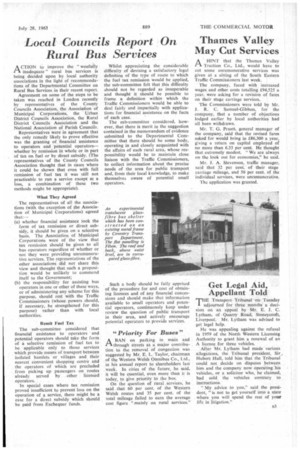Local Councils Report On Rural Bus Services
Page 37

If you've noticed an error in this article please click here to report it so we can fix it.
ACTION to improve the "woefully inadequate" rural bus services is being decided upon by local authority associations in the light of recommendations of the Departmental Committee on Rural Bus Services in their recent report.
Agreement on some of the steps to be taken was reached in London recently by representatives of the County Councils Association, the Association of Municipal Corporations, the Urban District Councils Association, the Rural District Councils Association and the National Association of Parish Councils.
Representatives were in agreement that the only remedy likely to prove effective was the granting of financial assistance to operators and potential operators— whether by remission in whole or in part of tax on fuel or by direct subsidy. (The representatives of the County Councils Association thought that in cases where it could be shown that even with full remission of fuel tax it was still not practicable to run a service except at a loss, a combination of these two methods might be appropriate).
What They Agreed The representatives of all the associa tions (with the exception of the Association of Municipal Corporations) agreed that:— (a) whether financial assistance took the form of tax remission or direct subsidy, it should be given on a selective basis. The Association of Municipal Corporations were of the view that tax remission should be given to all bus operators regardless of whether or not they were providing unremunerative services. The representatives of the other associations did not share this view and thought that such a proposilion would be unlikely to commend itself to the Government; (h) the responsibility for assisting bus operators in one or other of these ways, or of administering any scheme for this purpose, should rest with the Traffic Commissioners (whose powers should, if necessary, be strengthened for this purpose) rather than with local authorities.
Remit Fuel Tax The sub-committee considered that financial assistance to operators and potential operators should take the form of a selective remission of fuel tax to he applicable only to those services which provide means of transport between isolated hamlets or villages and their nearest convenient shopping centre and the operators of which are precluded from picking up passengers on routes already served by other licensed operators.
In special cases where tax remission proved insufficient to prevent loss on the operation of a service, there might be a case for a direct subsidy which should be paid from Exchequer funds. Whilst appreciating the considerable difficulty of devising a satisfactory legal definition of the type of route to which the fuel tax remission would be applied, the sub-committee felt that this difficulty should not be regarded as insuperable and thought it should he possible to frame a definition within which the Traffic Commissioners would be able to deal fairly and impartially with applications for financial assistance on the facts of each case.
The sub-committee considered, however, that there is merit in the suggestion contained in the memorandum of evidence submitted to the Departmental Committee that there should be some body, operating in and closely acquainted with the affairs of each rural area, whose responsibility would be to maintain close liaison with the Traffic Commissioners, to collect information about the precise needs of the area for public transport and, from their local knowledge, to make themselves aware of potential small operators.
Such a body should be fully apprised of the procedure for and cost of obtaining licences and of any financial concessions and should make that information available to small operators and potential operators, continuously keep under review the question of public transport in their area, and actively encourage potential operators to provide services.
"Priority For Buses"
A BAN on parking in main and 1–Ithrough streets as a major contribution to the removal of congestion was suggested by Mr. E. L. Taylor, chairman of the Western Welsh Omnibus Co., Ltd., in his annual report to shareholders last week. In cities of the future, he said, it will be essential, even more than it is today, to give priority to the bus.
On the question of rural services, he said that 60 per cent, of the Western Welsh routes and 35 per cent. of the total mileage failed to earn the average cost figure "mainly on rural services."




















































































































